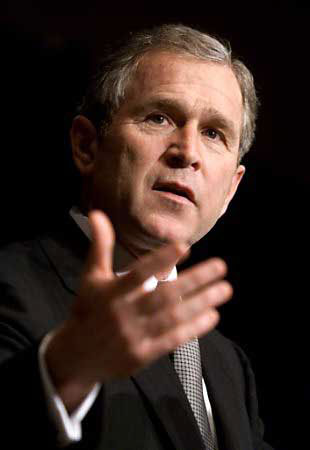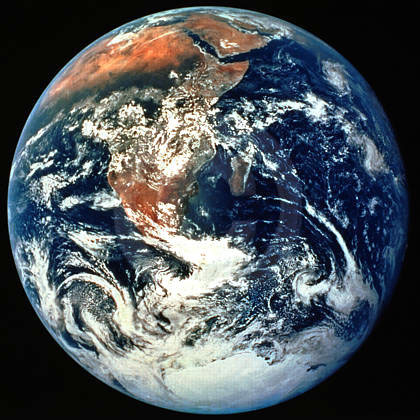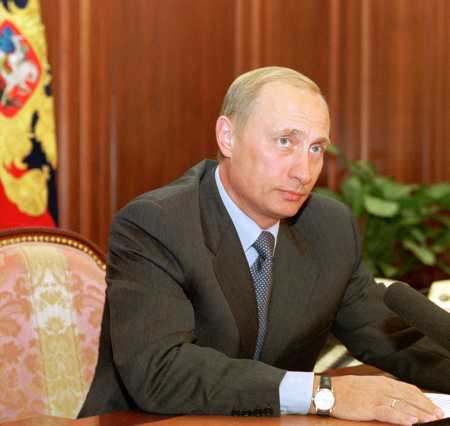
 |
 |
 |
 |
|
September 28, 2001
President George W. Bush
Dear Mr. Bush and Mr. Putin: When asked about the lack of warning before the World Trade Center disaster, one of our leaders replied it was not "a failure of intelligence, it was a failure of imagination; we failed to imagine a terrorist scenario so outrageous" as the attack on the WTC. Some of us are now concerned that our "failure of imagination" might also lead us to overlook some better solutions to the current crisis. For example, the world's nations spend $780 billion each year on purely military solutions. Just 30% of that amount could provide for every major human need in the world... from eliminating starvation, illiteracy and environmental ruin to providing good health care, shelter and clean drinking water. Why does this matter? Terrorists, like weeds, thrive only in hostile environments; they are a product of hard times intended to ensure life's continuity. In a world of abundance, weeds serve no useful purpose. But how to create this abundance? In the midst of Russia's Perestroika, Mikail Gorbachev grumbled, "Only Jesus knew how to feed multitudes with just a few loaves of bread and some fish." What the Loaves & Fishes story makes clear, however, is that our willingness to share our good -- instead of stockpiling it -- produces more than enough for all. Therefore, our strength lies not in our independence, but in our interdependence, as we saw in Lower Manhattan last week. In the world, unfortunately, nearly 2 billion people have no electricity. This means they also have no refrigeration, medicine, light, pumps, clean water or waste disposal; none of the necessities which are the foundation of everyday life for most of us. These are living conditions for weeds to thrive. But there is a simple solution to this problem. The financial cost is small, but the intellectual cost is high: we will lose our cherished belief that we are somehow separate from -- and better than -- all those other people in the world, all our enemies. We will have to find a new vision. Most pilots depend on their keen vision, especially when flying by "Visual Flight Rules." When the weather gets rough and visibility poor, however, highly-skilled pilots can switch to flying by intruments. This requires them to trust not what they see with their eyes, but what they know in their gut. It requires them to seek guidance from a higher authority than themselves. It requires a different kind of vision. When it comes to flying through life on instruments, the late Buckminster Fuller was one of the best. He was an engineer, architect and inventor who gave the world the geodesic dome and other artifacts. But one of his most cherished projects was called "The World Game," a simulation game played with thousands of students and business leaders in an attempt to answer this question: How do we make the world work for 100% of humanity,The repeated outcome of many World Game scenarios was the Global Energy Grid, which would link up existing transmission grids throughout the world into one world-wide network -- and would also link all the world's renewable energy resources in the process.
It is difficult to fight destruction through an effort that simply produces more destruction. The Global Energy Grid project, on the other hand, is the creation of something new, with tangible value: a sufficient standard of living for everyone in the world -- and a robust economy for both the U.S. and Russia. To understand how this works, consider that demand for electricity changes from hour to hour, hitting peak demand just once a day in any given time zone. And most utilities have built enough power plants to meet these "peak" needs. But power generators are most efficient when run continuously -- 24 hours a day. That's why it's sometimes cheaper for utilities in the Eastern Time Zone to buy surplus power from neighboring utilities than it is to turn on their own "peak" generators for one hour; the utilities in the Central Time Zone don't reach peak demand until an hour later. In fact, this practice of "power pooling" and long-distance energy trading now amounts to 40% of all electricity used in the U.S., according to the Electric Power Research Institute, resulting in total savings to consumers of over $35 billion a year. The Global Energy Grid project would simply make it possible for this practice to take place at the global level, allowing utilities to buy and sell surplus electricity with the other side of the world: Russia. Because when the Eastern Time Zone is at maximum usage, there's another time zone 12 hours away in Russia at its minimum and with most of its generators turned off. That's energy the Russians could be selling to America. But twelve hours later the situation would be reversed and American utilities would have surplus power to sell back to the Russians. The Global Energy Grid project offers a new way to approach energy shortages -- re-stating the problem of "not enough energy" to "not enough energy at the right place, at the right time. (It also offers a way to increase foreign trade between U.S. and Russia right now.) By using transmission lines to move electricity from where it is abundant to where it is scarce, this new World Wide Web of electricity would allow continuously-running generators in all 24 time zones to meet the peak demand in any one zone. The net result is twice as much electricity for all zones, in both countries, at half the price. It's such a simple idea -- a global energy network -- that most people wonder why it hasn't been done yet. After all, AT&T proved the advantages offered by a global communications network a long time ago, not to mention the global economic performance of the World Wide Web. The simple answer is that there has never been an AT&T in the electric utility industry, no international giant to develop and build an international solution. Instead, there have only been regional utilities who, for the past 100 years, worried only about meeting the peak needs of their own isolated service areas. And until 40 years ago, it wasn't economical to transmit power more than 350 miles, making it necessary to build power plants in separate service areas. New technologies developed in the 1960's, however, raised this limit to about 1500 miles and current research shows that today's effective distance for power transmission is 4000 miles. So it must be stressed that the proposed transmission lines are in no way new technology. For the most part, they are identical to lines which already connect Great Britain and France. The barriers to the project are not technological, but bureaucratic and political. The Global Energy Grid would require the U.S. to begin economic interdependence with Russia, for years America's bitter rival and enemy. (Of course, the positive side of interdependence is peace: it's bad business to go to war against your best customer.) It may even require "perestroika" among U.S. electric utilities, who for years have wasted time and energy fighting the prospect of deregulation, never seeking a global solution to energy shortages. But mostly, it requires visionary leaders who can see the long- range potential, as John Kennedy did, of placing mankind at the cutting edge of technological enterprise, of setting a 10-year goal and then challenging us to meet it, freeing human beings to do what humans do best. It requires a President who knows it's not enough to tear down walls -- we must also begin building bridges: energy bridges. It is wonderful that our two countries have begun working together to fight terrorism -- one can only hope we will also begin working together soon to create global abundance, peace and prosperity. Sincerely, |